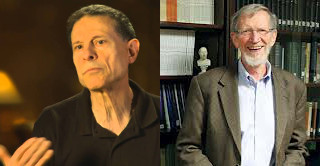









I found this on my hard drive. It’s a short piece I wrote back in 2005, shortly after the funeral of Pope John Paul II.
The Pope: Do They Love Him or Hate Him?
Moral Integrity vs Popular Tokenism
On Friday the 8th of April (New Zealand Time), the city of Rome saw its biggest funeral of all time, the funeral of Karol Jozef Wojtyla, better known to the world as Pope John Paul the second.
I watched with interest as current affairs show Campbell Live interviewed from Rome funeral attendee Catherine Hebblethwaite, co-author of The Next Pope. She explained, as host John Campbell nodded in agreement, that while many millions of people may have disagreed with the Pope’s teaching on moral issues, they nonetheless all looked up to him as a “great moral figure” worthy of respect and admiration. In fact this is not an isolated perspective. From a wide range of people, politicians, celebrities and Hollywood stars, religious figures and so forth, the message is fairly consistent. “While we disagree with his views, we think he is a great moral ‘figure’.” Well actually, that’s half true. People usually don’t say that they disagree with his views now that he’s dead, they just happen to have spent the last decade vilifying them.
Just how much sense does this really make?
What does it take to make somebody a great moral teacher, leader or figure? Presumably, one would think, it has something to do with a person’s take on moral issues. If the stances that a person takes are moral, and if they teach and encourage their admirers to uphold moral virtue and avoid moral vice, then they’re a great moral teacher. Right? If some aging Palestinian went around telling all his followers to go to crowded transport terminals and blow themselves up, or if a writer encouraged all his readers to molest children, or if he preached to the masses and urged them to burn down the homes of black people, we wouldn’t call him a great moral teacher. He would have to preach a message that we really do embrace and consider moral. He would have to be a person who upholds what we consider to be morally virtuous and noble. He could not be somebody who taught against the moral values that we hold dear, or we would not consider him moral.
What is it about the Pope then, that makes leaders like Helen Clark, along with Hollywood celebrities and just about everyone else, say that he was a great moral teacher or leader? What is it about him that appeals to their moral senses?
Could it be the way the Pope shared their commitment to personal sexual autonomy, and how he managed to avoid the shackles of traditional sexual mores when it comes to stuffy old institutions like Christian marriage? Maybe it was the way he said that all relationship choices as equally valid, regardless of whether one comes to embrace heterosexuality, homosexuality, bisexuality, or anything else? Perhaps they think his morals were top-notch because of the way he viewed a woman’s right to terminate a pregnancy on the grounds of her right to use her body as she sees fit? Or perhaps they were attracted to his stance on sexual safety, how he agreed with them that condoms save lives and provide the answer to avoiding sexually transmitted diseases, rather than prattling on about outdated moral artefacts like abstinence. Yes, it’s just obvious why so many people praise this moral figure. Clearly he spoke their mind!
There is the odd exceptional person who is honest about it all. Some people realize that it’s dishonest to go about moping and mourning the loss of a “great moral teacher” while believing that he was really a moral idiot who got just about everything wrong as far as morality is concerned. Occasionally you’ll hear somebody say, “Why are we sobbing in the streets over the inevitable death of a man who, in reality, didn’t have much time for those of us who didn’t toe his company line?”
But where are the Hollywood celebrities who say “The Pope claimed that abortion is morally on par with murder. He condemned the homosexual lifestyle as immoral. He said that women ought not to be priests. He believed that abstinence, rather than condoms, is the way to avoid sexually transmitted diseases. He said that people who have sex outside of marriage are sinning. Yes, he really was a great moral teacher.” It’s strange that while we hear all this trendy talk about what a great moral figure he was, we never hear about which aspects of his morality made him so great. It seems Hollywood stars and Helen Clark have one thing in common: They know which side of their bread gets the butter. If they tell the truth about what they think about the Pope’s moral teaching, they’ll end up calling him a bigot, and they’ll be unpopular. So instead they opt for some suitably vague patronising rubbish about what a great moral figure the guy was, in the hopes that people will saw “aww, they really do care!”
Before anybody gets all up-in-arms at me for having a go at a nice old man who has just died, I’m not. I’m having a go at people who say that they are sad at the Pope’s death because he was a great moral figure, when in reality they think he was a morally twisted bigot. I think the pope was a great moral teacher because I think, generally speaking, that he was correct in the moral views he upheld. That’s the difference between having moral integrity when you say that somebody was a good man, and being a hypocrite who bows to popular politically correct token gestures and poseurism. Say what you mean, the public is not so stupid that we don’t know it already.

 It’s back!
It’s back!


 Here’s Episode 13, which is part 2 of my coverage of Plantinga and presuppositional apologetics.
Here’s Episode 13, which is part 2 of my coverage of Plantinga and presuppositional apologetics.